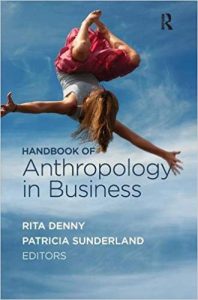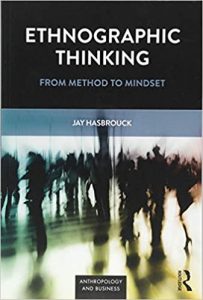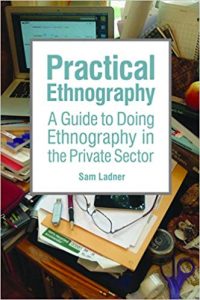National Association for the Practice of Anthropology
10 Must-Read Books on Anthropology in Business and Design
In 2011, when I first began my career as a researcher in the context of business and design, I knew almost nothing about the field I had decided to work in. I lacked a basic understanding of how products are designed, how businesses work, and how to work with people in this world. What I did know was that my anthropology training was highly relevant, but I needed to learn as much as I could to supplement it. I devoured every possible resource I could on these topics, from websites and blogs to journals and books. Doing so helped me effectively transition into being a researcher in industry, translate my skills to non-anthropologists, and do my job with passion and success. I felt less like an impostor and more confident in myself.
Many of the books I read were written by people trained in disciplines such as human factors, human-computer interaction, psychology, programming, and product design – the most common disciplines for design practitioners. However, some of the most useful resources were written by anthropologists with extensive experience in the field. Doing anthropology in business and design became much more tangible and clear to me, and my concept of applying anthropology evolved by way of these readings. Many more books have been published throughout the past several years. These important contributions continue to build up the anthropological knowledge base and assist others in making the transition.
Because this blog tracks developments in anthropology, design, and user experience, I thought it would be useful to list out the following titles (with summaries directly from the publishers), which are my top recommendations for books on business and design written from an anthropological perspective. They remain an important resource for my work and I return to them regularly for ideas, methods and perspectives. Useful for students, graduates, practitioners and academics who are interested in this field, they cover topics such as user experience research, product design, consumer insights, ethics, reflexivity, design ethnography, organizational development and consulting.
Overviews of the Field
Business Anthropology by Ann Jordan (2015)
 Viewed as a breakthrough in applied anthropology, Business Anthropology was the first concise work to juxtapose, compare, and integrate anthropological methods and theories with those of contemporary business practices and theories. In this latest edition, Jordan retains enduring, illustrative examples and adds fresh insights to familiarize readers with anthropological techniques and show their ever-growing utility in a variety of organizational and consumer settings. Business Anthropology explains how anthropologists’ distinctive training and skills equip them to address issues ranging from work processes, diversity, and globalization to product design and consumer behavior, in both for-profit and nonprofit organizations. Anthropologists use a holistic approach to gather and analyze data. They get to know people both inside and outside the organization, understand diverse perspectives from an objective viewpoint, gain in-depth knowledge about local wants and needs, and see old realities in new ways.
Viewed as a breakthrough in applied anthropology, Business Anthropology was the first concise work to juxtapose, compare, and integrate anthropological methods and theories with those of contemporary business practices and theories. In this latest edition, Jordan retains enduring, illustrative examples and adds fresh insights to familiarize readers with anthropological techniques and show their ever-growing utility in a variety of organizational and consumer settings. Business Anthropology explains how anthropologists’ distinctive training and skills equip them to address issues ranging from work processes, diversity, and globalization to product design and consumer behavior, in both for-profit and nonprofit organizations. Anthropologists use a holistic approach to gather and analyze data. They get to know people both inside and outside the organization, understand diverse perspectives from an objective viewpoint, gain in-depth knowledge about local wants and needs, and see old realities in new ways.
Ethnography and the Corporate Encounter: Reflections on Research in and of Corporations by Melissa Cefkin (2010)
 Businesses and other organizations are increasingly hiring anthropologists and other ethnographically-oriented social scientists as employees, consultants, and advisors. The nature of such work, as described in this volume, raises crucial questions about potential implications to disciplines of critical inquiry such as anthropology. In addressing these issues, the contributors explore how researchers encounter and engage sites of organizational practice in such roles as suppliers of consumer-insight for product design or marketing, or as advisors on work design or business and organizational strategies. The volume contributes to the emerging canon of corporate ethnography, appealing to practitioners who wish to advance their understanding of the practice of corporate ethnography and providing rich material to those interested in new applications of ethnographic work and the ongoing rethinking of the nature of ethnographic praxis.
Businesses and other organizations are increasingly hiring anthropologists and other ethnographically-oriented social scientists as employees, consultants, and advisors. The nature of such work, as described in this volume, raises crucial questions about potential implications to disciplines of critical inquiry such as anthropology. In addressing these issues, the contributors explore how researchers encounter and engage sites of organizational practice in such roles as suppliers of consumer-insight for product design or marketing, or as advisors on work design or business and organizational strategies. The volume contributes to the emerging canon of corporate ethnography, appealing to practitioners who wish to advance their understanding of the practice of corporate ethnography and providing rich material to those interested in new applications of ethnographic work and the ongoing rethinking of the nature of ethnographic praxis.
Handbook of Anthropology in Business by Rita Denny and Patricia Sunderland (2014)
 In recent years announcements of the birth of business anthropology have ricocheted around the globe. The first major reference work on this field, the Handbook of Anthropology in Business is a creative production of more than 60 international scholar-practitioners working in universities and corporate settings from high tech to health care. Offering broad coverage of theory and practice around the world, chapters demonstrate the vibrant tensions and innovation that emerge in intersections between anthropology and business and between corporate worlds and the lives of individual scholar-practitioners. Breaking from standard attempts to define scholarly fields as products of fixed consensus, the authors reveal an evolving mosaic of engagement and innovation, offering a paradigm for understanding anthropology in business for years to come.
In recent years announcements of the birth of business anthropology have ricocheted around the globe. The first major reference work on this field, the Handbook of Anthropology in Business is a creative production of more than 60 international scholar-practitioners working in universities and corporate settings from high tech to health care. Offering broad coverage of theory and practice around the world, chapters demonstrate the vibrant tensions and innovation that emerge in intersections between anthropology and business and between corporate worlds and the lives of individual scholar-practitioners. Breaking from standard attempts to define scholarly fields as products of fixed consensus, the authors reveal an evolving mosaic of engagement and innovation, offering a paradigm for understanding anthropology in business for years to come.
Organizational Ethnography
Advancing Ethnography in Corporate Environments: Challenges and Emerging Opportunities by Brigitte Jordan (2013)
 In this innovative volume, twelve leading scholars from corporate research labs and independent consultancies tackle the most fundamental and contentious issues in corporate ethnography. Organized in pairs of chapters in which two experts consider different sides of an important topic, these provocative encounters go beyond stale rehearsals of method and theory to explore the entanglements that practitioners wrestle with on a daily basis. The discussions are situated within the broader universe of ethnographic method and theory, and are also grounded in the practical realities of using ethnography to solve problems in the business world. The book represents important advances in the field and is ideal for students and scholars as well as for corporate practitioners and decision makers.
In this innovative volume, twelve leading scholars from corporate research labs and independent consultancies tackle the most fundamental and contentious issues in corporate ethnography. Organized in pairs of chapters in which two experts consider different sides of an important topic, these provocative encounters go beyond stale rehearsals of method and theory to explore the entanglements that practitioners wrestle with on a daily basis. The discussions are situated within the broader universe of ethnographic method and theory, and are also grounded in the practical realities of using ethnography to solve problems in the business world. The book represents important advances in the field and is ideal for students and scholars as well as for corporate practitioners and decision makers.
Ethnographic Thinking by Jay Hasbrouck (2018)
 This book argues that ‘ethnographic thinking’―the thought processes and patterns ethnographers develop through their practice―offers companies and organizations the cultural insights they need to develop fully-informed strategies. Using real world examples, Hasbrouck demonstrates how shifting the value of ethnography from simply identifying consumer needs to driving a more holistic understanding of a company or organization can help it benefit from a deeper understanding of the dynamic and interactive cultural contexts of its offerings. In doing so, he argues that such an approach can also enhance the strategic value of their work by helping them increase appreciation for openness and exploration, hone interpretive skills, and cultivate holistic thinking, in order to broaden perspectives, challenge assumptions, and cross-pollinate ideas between differing viewpoints.
This book argues that ‘ethnographic thinking’―the thought processes and patterns ethnographers develop through their practice―offers companies and organizations the cultural insights they need to develop fully-informed strategies. Using real world examples, Hasbrouck demonstrates how shifting the value of ethnography from simply identifying consumer needs to driving a more holistic understanding of a company or organization can help it benefit from a deeper understanding of the dynamic and interactive cultural contexts of its offerings. In doing so, he argues that such an approach can also enhance the strategic value of their work by helping them increase appreciation for openness and exploration, hone interpretive skills, and cultivate holistic thinking, in order to broaden perspectives, challenge assumptions, and cross-pollinate ideas between differing viewpoints.
Ethnographic Thinking is key reading for managers and strategists specifically wishing to tap-into the potential that ethnography offers, as well as those searching more broadly for new ways to innovate practice. It is essential reading for students of applied ethnography, and recommended for scholars too.
Doing Anthropology and Ethnography in Design and Consumer Research
Design + Anthropology: Converging Pathways in Anthropology and Design by Christine Miller (2018)
 This book explores the evolution of two disciplines, design and anthropology, and their convergence within commercial and organizational arenas. Focusing on the transdisciplinary field of design anthropology, the chapters cover the global forces and conditions that facilitated its emergence, the people that have contributed to its development and those who are likely to shape its future. Christine Miller touches on the invention and diffusion of new practices, the recontextualization of ethnographic inquiry within design and innovations in applications of anthropological theory and methodology. She considers how encounters between anthropology and ‘designerly’ practice have impacted the evolution of both disciplines. The book provides students, scholars and practitioners with valuable insight into the movement to formalize the nascent field of design anthropology and how the relationship between the two fields might develop in the future given the dynamic global forces that continue to impact them both.
This book explores the evolution of two disciplines, design and anthropology, and their convergence within commercial and organizational arenas. Focusing on the transdisciplinary field of design anthropology, the chapters cover the global forces and conditions that facilitated its emergence, the people that have contributed to its development and those who are likely to shape its future. Christine Miller touches on the invention and diffusion of new practices, the recontextualization of ethnographic inquiry within design and innovations in applications of anthropological theory and methodology. She considers how encounters between anthropology and ‘designerly’ practice have impacted the evolution of both disciplines. The book provides students, scholars and practitioners with valuable insight into the movement to formalize the nascent field of design anthropology and how the relationship between the two fields might develop in the future given the dynamic global forces that continue to impact them both.
Doing Anthropology in Consumer Research by Patricia L. Sunderland and Rita M. Denny (2010)
 Doing Anthropology in Consumer Research is the essential guide to the theory and practice of conducting ethnographic research in consumer environments. Patricia Sunderland and Rita Denny argue that, while the recent explosion in the use of “ethnography” in the corporate world has provided unprecedented opportunities for anthropologists and other qualitative researchers, this popularization too often results in shallow understandings of culture, divorcing ethnography it from its foundations. In response, they reframe the field by re-attaching ethnography to theoretically robust and methodologically rigorous cultural analysis. The engrossing text draws on decades of the authors’ own eclectic research―from coffee in Bangkok and boredom in New Zealand to computing in the United States―using methodologies from focus groups and rapid appraisal to semiotics and visual ethnography. Five provocative forewords by leaders in consumer research further push the boundaries of the field and challenge the boundaries of academic and applied work. In addition to reorienting the field for academics and practitioners, this book is an ideal text for students, who are increasingly likely to both study and work in corporate environments.
Doing Anthropology in Consumer Research is the essential guide to the theory and practice of conducting ethnographic research in consumer environments. Patricia Sunderland and Rita Denny argue that, while the recent explosion in the use of “ethnography” in the corporate world has provided unprecedented opportunities for anthropologists and other qualitative researchers, this popularization too often results in shallow understandings of culture, divorcing ethnography it from its foundations. In response, they reframe the field by re-attaching ethnography to theoretically robust and methodologically rigorous cultural analysis. The engrossing text draws on decades of the authors’ own eclectic research―from coffee in Bangkok and boredom in New Zealand to computing in the United States―using methodologies from focus groups and rapid appraisal to semiotics and visual ethnography. Five provocative forewords by leaders in consumer research further push the boundaries of the field and challenge the boundaries of academic and applied work. In addition to reorienting the field for academics and practitioners, this book is an ideal text for students, who are increasingly likely to both study and work in corporate environments.
Ethics in the Anthropology of Business by Timothy de Waal Malefyt and Robert J. Morais (2017)
 Ethics in business is a major topic both in the social sciences and in business itself. Anthropologists, long attendant to the intersection of ethics and practice, are particularly well suited to offer vital insights on the subject.
Ethics in business is a major topic both in the social sciences and in business itself. Anthropologists, long attendant to the intersection of ethics and practice, are particularly well suited to offer vital insights on the subject.
This timely collection considers a range of ethical issues in business through the examination of anthropologically informed theory and case examples. The meaning of ethical values, practices, and education are explored, as well as practical ways of implementing them, while the specific ethical challenges of industries such as advertising, market research, and design are considered. Contributions from anthropologists in business and academia promise a broad range of perspectives and add to the growing discussion on the ways anthropologists study, work, teach, and engage in a variety of industry settings.
Engagingly written, Ethics in the Anthropology of Business will be of interest to a wide variety of audiences, including practicing anthropologists, current and future business leaders, and scholars and students from a range of social sciences.
People-Centered Innovation: Becoming a Practitioner in Innovation Research by Pedro Oliveira (2013)
 Written with a general audience in mind, People-Centered Innovation focuses on innovation research in corporate settings. Starting with a biographical standpoint, it describes the author’s transition from the fields of psychology and anthropology into the fields of business anthropology and innovation. Through a rich description of case-studies of corporate work, the author takes us into a fascinating journey across different ways of observing relations between consumers and corporations and generating new ideas based on that observation.
Written with a general audience in mind, People-Centered Innovation focuses on innovation research in corporate settings. Starting with a biographical standpoint, it describes the author’s transition from the fields of psychology and anthropology into the fields of business anthropology and innovation. Through a rich description of case-studies of corporate work, the author takes us into a fascinating journey across different ways of observing relations between consumers and corporations and generating new ideas based on that observation.
Practical Ethnography: A Guide to Doing Ethnography in the Private Sector by Sam Ladner (2014) (Note: Ladner is a sociologist but I consider her to be an honorary anthropologist and leader in ethnographic methods)
 Ethnography is an increasingly important research method in the private sector, yet ethnographic literature continues to focus on an academic audience. Sam Ladner fills the gap by advancing rigorous ethnographic practice that is tailored to corporate settings where colleagues are not steeped in social theory, research time lines may be days rather than months or years, and research sponsors expect actionable outcomes and recommendations. Ladner provides step-by-step guidance at every turn – covering core methods, research design, using the latest mobile and digital technologies, project and client management, ethics, reporting, and translating your findings into business strategies. This book is the perfect resource for private-sector researchers, designers, and managers seeking robust ethnographic tools or academic researchers hoping to conduct research in corporate settings. More information on the book is available at http://www.practicalethnography.com/
Ethnography is an increasingly important research method in the private sector, yet ethnographic literature continues to focus on an academic audience. Sam Ladner fills the gap by advancing rigorous ethnographic practice that is tailored to corporate settings where colleagues are not steeped in social theory, research time lines may be days rather than months or years, and research sponsors expect actionable outcomes and recommendations. Ladner provides step-by-step guidance at every turn – covering core methods, research design, using the latest mobile and digital technologies, project and client management, ethics, reporting, and translating your findings into business strategies. This book is the perfect resource for private-sector researchers, designers, and managers seeking robust ethnographic tools or academic researchers hoping to conduct research in corporate settings. More information on the book is available at http://www.practicalethnography.com/
(Thanks to Amy Goldmacher and Terry Redding for feedback on drafts of this post.)
Amy Santee
Amy is a design researcher and anthropologist (M.A., University of Memphis, 2011) who helps teams build products, services and brands through an understanding of people, context and experience. Her work focuses on product development, innovation, and business strategy. She has worked in digital, hardware and retail experience design across several areas, including e-commerce, entertainment, health care, automotive, consumer tech, wearables, civic design and small business. Amy blogs about design, business, organizational culture, jobs and careers, and practical tools and resources at www.anthropologizing.com.




For more reading, see: https://www.businessanthro.com/books-and-journals